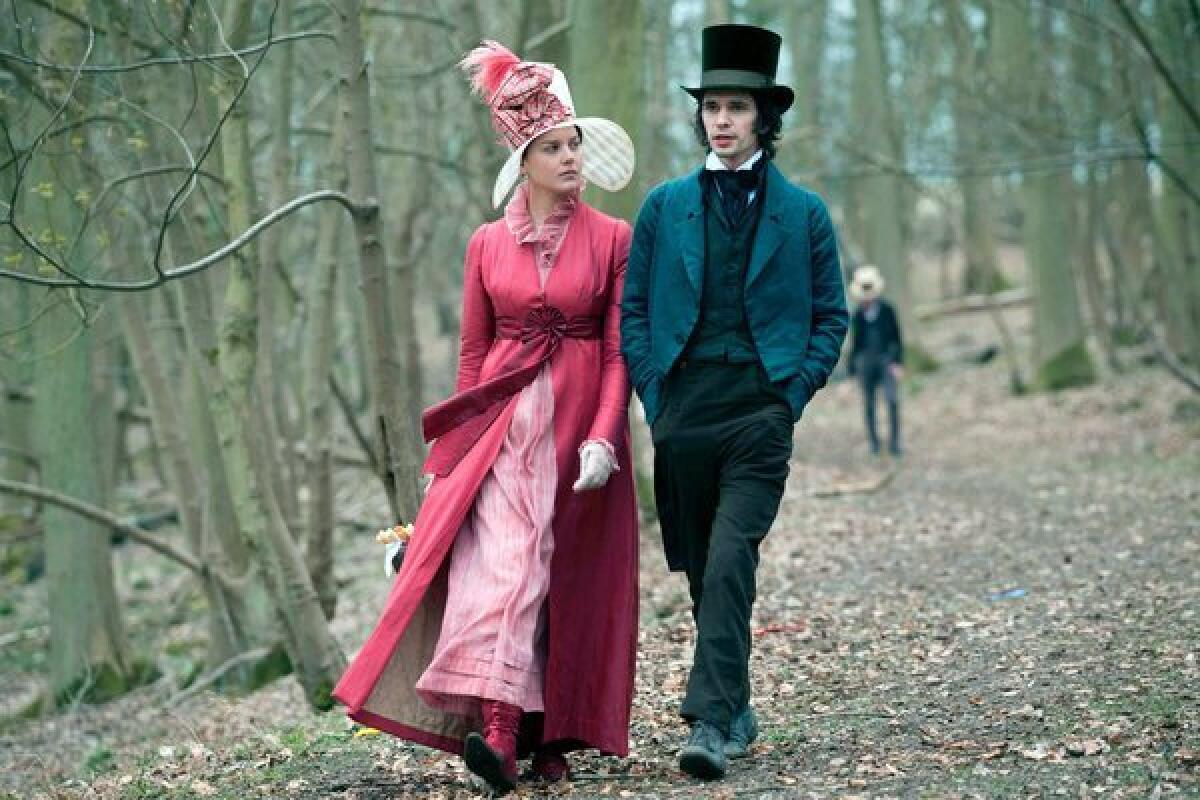Happy birthday, John Keats

- Share via
Happy birthday, John Keats. The Romantic poet best known for his odes -- “Ode on a Grecian Urn,” “Ode on Indolence,” “Ode on Melancholy,” “Ode to a Nightingale” and “Ode to Psyche” -- was born 218 years ago today.
The great English poet died in 1821 at the age of 25. He was born on Halloween in 1795, more than a century before English children took up the custom of wearing costumes on All Hallows’ Eve, though he surely would have enjoyed listening to goblins recite a certain rhyme at their neighbor’s doors.
One of the earliest stories told about the poet’s childhood was that as a small boy “instead of answering questions put to him, he would always make a rhyme to the last word people said, and then laugh,” Andrew Motion recounts in his 1997 biography.
“There was a naughty boy/a naughty boy was he,” Keats began in the poem “Song About Myself,” which he wrote in 1818 to his “bright star” and muse, Fanny Brawne. “He would not stop at home/He could not quiet be...”
Remarking on Keats’ Oct. 31 birthday, the astrologically inclined poet David Lehman once wrote: “Poor Keats. A Scorpio with Virgo rising and, just to clinch the deal, his moon in Gemini. This is the equivalent of being dealt the Fool, the Lovers (inverted), and the Tower as the three culminating cards in an eleven-card Tarot reading.”
If you’re in London, there will be a birthday celebration at Keats House Hampstead (where the poet lived when he fell in love with Brawne). But no matter where you are, an especially appropriate commemoration of the life of the poet (seasonally speaking) could involve reading one of his most celebrated poems, “To Autumn.”
The late Seamus Heaney said he loved the poem as a schoolboy, calling it (in his 1995 Nobel lecture) “an ark of the covenant between language and sensation.” Carole Rumens wrote a wonderful appreciation of the poem in the Guardian last month, noting that it’s probably the most anthologized of all English poems.
To Autumn Season of mists and mellow fruitfulness,
Close bosom-friend of the maturing sun;
Conspiring with him how to load and bless
With fruit the vines that round the thatch-eaves run;
To bend with apples the moss’d cottage-trees,
And fill all fruit with ripeness to the core;
To swell the gourd, and plump the hazel shells
With a sweet kernel; to set budding more,
And still more, later flowers for the bees,
Until they think warm days will never cease,
For Summer has o’er-brimm’d their clammy cells.
Who hath not seen thee oft amid thy store?
Sometimes whoever seeks abroad may find
Thee sitting careless on a granary floor,
Thy hair soft-lifted by the winnowing wind;
Or on a half-reap’d furrow sound asleep,
Drows’d with the fume of poppies, while thy hook
Spares the next swath and all its twinéd flowers:
And sometimes like a gleaner thou dost keep
Steady thy laden head across a brook;
Or by a cyder-press, with patient look,
Thou watchest the last oozings hours by hours.
Where are the songs of Spring? Ay, where are they?
Think not of them, thou hast thy music too,—
While barréd clouds bloom the soft-dying day,
And touch the stubble-plains with rosy hue;
Then in a wailful choir the small gnats mourn
Among the river sallows, borne aloft
Or sinking as the light wind lives or dies;
And full-grown lambs loud bleat from hilly bourn;
Hedge-crickets sing; and now with treble soft
The red-breast whistles from a garden-croft;
And gathering swallows twitter in the skies.
ALSO:
Why don’t iconic novels translate into film?
They said no to Alice Munro: The Nobel winner’s rejection letters
Orson Scott Card’s anti-gay views haunt ‘Ender’s Game’ premiere
hector.tobar@latimes.com
More to Read
Sign up for our Book Club newsletter
Get the latest news, events and more from the Los Angeles Times Book Club, and help us get L.A. reading and talking.
You may occasionally receive promotional content from the Los Angeles Times.








